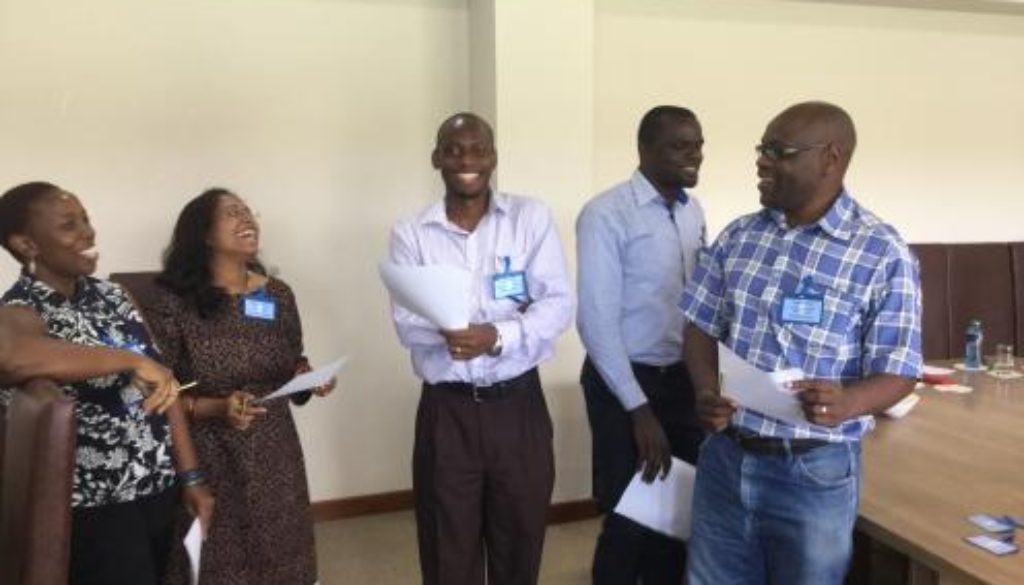Voting with your feet: Gender, power and positionality on international women’s day
In this blog post, we discuss different views on how gender dynamics play out in health systems.
The RinGs’ Team
“Voting with your feet” was an ice-breaker for our RinGS meeting in Kilifi, Kenya as a way to get discussions going and make views explicit in our ongoing meeting on gender. We read out the following statements and colleagues stood at one end of the room if they fully agreed, at the other if they disagreed, or alternatively somewhere in the middle.
Here are the statements: all of which triggered participants taking a range of places across the room (which by the way has amazing views over the Indian Ocean!)
- Gender roles and relations are so context specific you cannot generalise learning across countries;
- It is unfair and inappropriate to expect service providers to mitigate power dynamics between the couple seeing services;
- Increasing men’s participation in family planning and reproductive health programmes will only further increase men’s power over women.
On question of context specificity many colleagues were right up against the “yes” wall – citing examples of the ways in which gender roles and relations are inextricably bound with context, down to the detail of Maasai hair styles. At the other end of the room were those who argued that we need to find ways to learn across contexts and that issues of power relations are systemic and apply and are felt by all of us shaping our everyday lives, whether we believe we have power or not. All too often we focus our attention on those we believe to have limited power, while neglecting subjecting the structures and systems that maintain privilege to the rigours of gender analysis and change. Sreytouch Vong from Cambodia stated that “gendered power shapes human resources for health and leadership“; with the depth and detail of context made explicit this is a nice example of the ways in which we can bring conceptual learning on gender across contexts, building spaces and coalitions for joint action on issues of mutual concern.
When discussing the role of service providers in intervening in power dynamics, many thought this is indeed both their role and responsibility. Health care workers within services focusing on family, planning, HIV and child health are better able to see and respond to negative power dynamics and outcomes such as gender based violence and coercion. Others were concerned that health care workers have limited resources, limited time and potentially limited skills to respond to issues like this. Depending on the issue, intervention may exacerbate problems or have negative unintended consequences.
Many thought increasing men’s participation in services which are traditionally considered the domain of women and girls would have positive outcomes such as greater support for women in accessing timely care, more shared and consensual decision making around contraception and sexual health. Others argued that family planning is one of the few areas where women have choices, options and more knowledge and there is danger of men co-opting this and using it to their advantage. Ultimately health care providers working in this area need to be appropriately skilled, supported and resourced.
Going back to question one, the generalisable learning is that health sector can and should be a part of the journey to transform gender power relations and foster people centred care. But this will only work if health workers, including community health workers, working at the front line of care and community health system intersection are appropriately supported. This is also part of a largely social, economic and political endeavour to overcome inequity and encourage change at an individual, social and structural level. The discussions highlighted the role of intersectionality because gender is not the only contour of analysis, but cautioned that we often focus on the disadvantaged who are also powerless and tend to forget the “powerful”. In the sum up of the discussions, we concluded that during gender analysis we have to ask how do key findings resonate with the literature. As a starting point the health sector needs to engage and with and learn from other sectors and be part of a joined up approach to a more gender equitable society. International women’s day is an appropriate day to begin thinking about the ‘how to’ of these challenges.
Participants included: Debjani Barman, Stephen Buzuzi, Asha George, Kate Hawkins, Dorcas Kamuya, Tani Kassimu, Richard Mangwi, Sassy Molyneux, Rosemary Morgan, Kelly Muraya, David Musoke, Ezumah Nkoli Nwakego, Tumaini Nyamhanga, Samuel Okaro, Sarah Ssali, Charles Ssemugabo, Sally Theobald, Sreytouch Vong

